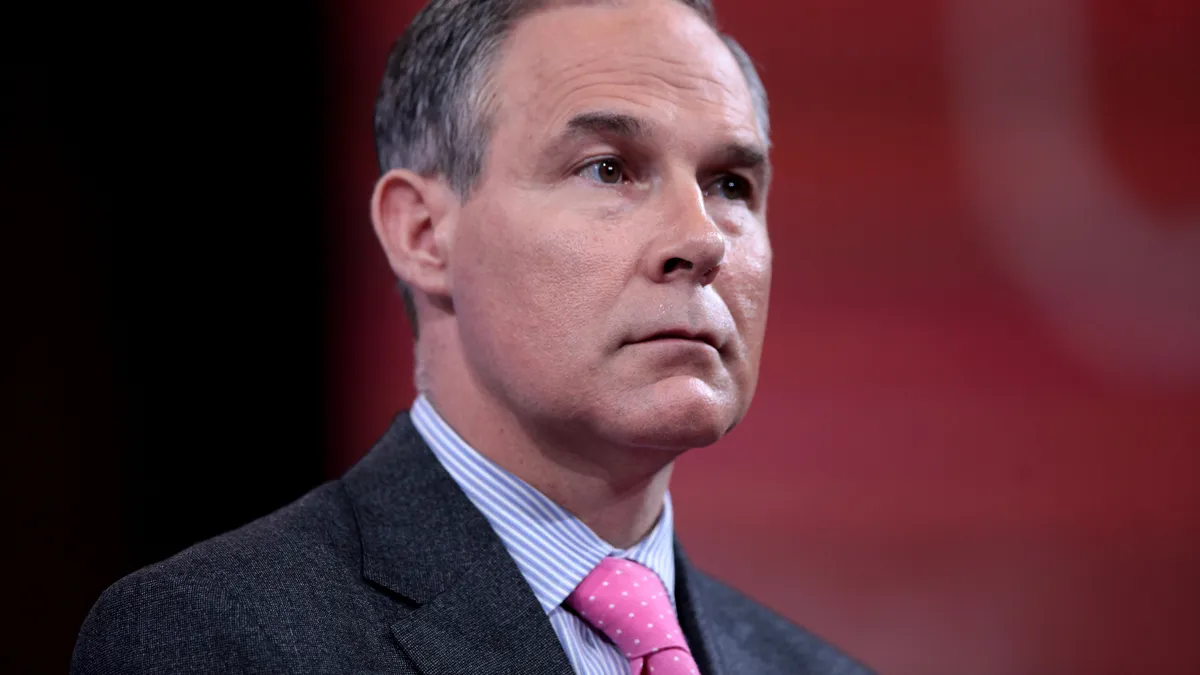Dive Brief:
- The Environmental Protection Agency will justify its coming repeal of the Clean Power Plan with new cost calculations that estimate scrapping the Obama-era climate regulations will save the power sector $33 billion by 2030, Politico and Bloomberg report.
- The EPA is set to announce the CPP repeal in the coming days, asking industry for comments on how to replace the rule. The agency will likely use the new cost calculations as legal justification for a less-stringent pollution regulation.
- Clean Power Plan supporters told the media outlets the EPA's cost calculations fail to account for recent power sector trends. The EPA faces a Friday deadline to issue action on the CPP, which was put on hold by the D.C. Circuit Court of Appeals in April.
Dive Insight:
When the Obama administration finalized the Clean Power Plan in 2015, it argued benefits from cleaner air, greater energy efficiency and less severe climate change would justify costs to utilities.
The Trump administration is reportedly set to reverse that conclusion, arguing that compliance with the regulatory package would cost the power sector $33 billion by 2030 — far outweighing expected efficiency benefits of $18.8 billion and climate benefits of $500 million, Bloomberg reports.
To get to that conclusion, Politico reports EPA will drastically change how it accounts for health and climate change impacts in its cost-benefit analyses. While the Obama White House directed agencies to consider global climate impacts as a part of their social cost of carbon measurement, the Trump White House has told them to focus only on impacts within U.S. borders.
The new cost calculations are expected to form legal justification for repeal of the Obama-era climate regulations, which aimed to cut carbon emissions from the power sector 32% by 2030. Media reports this week suggest the EPA will not propose a final rule in the coming days, but rather issue an Advanced Notice of Proposed Rulemaking to ask for input as it considers a replacement.
Bloomberg reports a draft of the proposal will ask stakeholders to focus comments on pollution control technologies that can be "applied to or at a single source." That likely signals a significant departure from the Clean Power Plan, which controversially required coal plant owners to seek additional emissions abatement from other sources, such as procuring renewables.
The so-called "fenceline provision" was a key argument that CPP critics, including Pruitt, used to challenge the regulations in court last year. Pruitt also drafted an "inside the fence" alternative to CPP back in 2014 when he challenged the federal rule as Oklahoma attorney general.
Asking for input on a new carbon rule will likely extend the timeline to finalize a CPP replacement, and the Trump administration could still decline to issue a new regulation if it believes it's not justified.
However, not replacing the rule would likely open the agency to legal challenges based on its 2009 carbon endangerment finding, which compels EPA to regulate greenhouse gases as a public health threat. Conservative groups have expressed frustration that Pruitt has not moved to dismantle the rule already, and the administrator has shown appetite for the fight before, signing on to a legal challenge in 2012.
Despite a deadlne to act on the CPP by Friday, it remains unclear when the agency will move. Earlier this week, EPA missed a deadline to designate non-attainment areas for its ground-level ozone regulations, prompting a lawsuit threat from 14 states.













